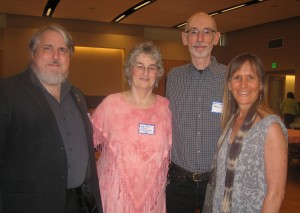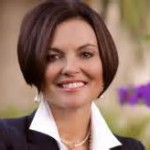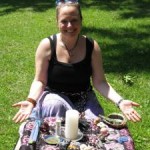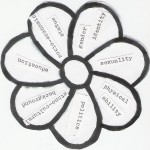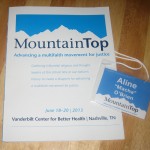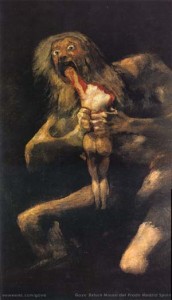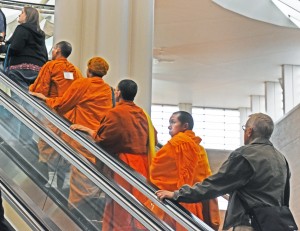What’s a Witch to do when her interfaith council’s 15th Annual Interfaith Prayer Breakfast, which occurs on the first Thursday in May, falls on Beltane? Well, she sings up the Sun with the Berkeley Morris Dancers at dawn, then hustles across the bridge to Tiburon with her Wiccan (Gardnerian, to be specific) interfaith colleague, Don Frew, to rendezvous with Matt Whealton, a practitioner of Kemetic religion from the Temple of Ra, at his first foray into interfaith activities.
I attend this event every year. MIC began hosting its own truly interfaith prayer breakfast on the same day that conservative Christians hold a breakfast meeting in Washington, D.C., with the President in attendance. National Day of Prayer was established by Congress and signed into law by President Harry Truman in 1952, although it has antecedents that go back as far as the Second Continental Congress in 1775, when citizens were supposed to observe “a day of publick [sic] humiliation, fasting, and prayer”… and to bless our rightful sovereign, King George the Third…” I daresay that, considering that their 2014 theme is “Lord, hear our prayer!” the factions who created the day have not evolved to appreciate the religious diversity found in the U.S. today, in 2014 C.E. (Common Era).
MIC’s breakfast, though it is partly about and does include prayer, celebrates religious diversity. The breakfast customarily features three different speakers from three different religious traditions speaking about that particular religion. Three years ago Don Frew, representing Witches, spoke, along with a Buddhist and a Mormon.
* * * * *
This year we heard two other speakers, in addition to the three featured religious teachers: Annie Reynolds, MIC Board member and Tamalpais High School Senior, announced a youth program later in the month.
* * * * *
This is not just high-minded talk. This is real people doing real work to benefit the lives of our fellow humans.I was most moved by the reports of Heidi Kühn, Founder and CEO of Roots of Peace, “a nonprofit, non-religious NGO turning mines to vines – replacing minefields with bountiful vineyards and orchards worldwide.” Heidi told us of having her home in Kabul attacked by Taliban fighters just last month. As it turned out, the attack had been focused on the preschool next door to her home. Cowards shooting at five-year-olds!!! Heidi said that the Afghan forces who were supposed to be protecting them, as American peace workers, resisted the Taliban forces for an attack that lasted four and one-half hours! Ultimately the Afghani forces succeeded and the fighting ended.
* * * * *

Speaking on behalf of the Bahá’í faith, Darrell Metcalf of the Spiritual Assembly of the Bahá’í of San Rafael, explained that the religion was founded in Persia on May 23, 1844, and now claims more than seven million followers worldwide. Darrell spoke of three core principles of oneness: “unity of God,” “unity of religion,” and “unity of humanity.” He said, “Like mirrors, we tend to reflect what we give attention to.”
* * * * *
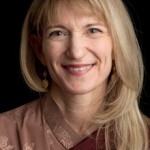
Sukhasiddhi Foundation’s Core ValuesThird to speak was Lama Palden Drolma of the Sukhasiddi Foundation, “founded in 1996 … [to] provides a vehicle for the teaching and practice of Vajrayana Buddhism in the West. … emphasizing “the cultivation of deep realization and understanding – even in the midst of our ordinary lives – so that wisdom, compassion and loving-kindness can open and flourish within us.”
- Honoring the feminine principles of openness, relatedness, peace, harmony, natural unfolding, embracing, nourishing, unconditional love, and wisdom;
- Embracing the masculine principles of clarity, one-pointed concentration, grounded strength, skillful activity, organizing, discernment, and creativity;
- Bringing the inner feminine and masculine principles into harmony, fruition, and union. Integrating spirit, psyche, and body and integrating practice with everyday life;
- Practicing being a good world citizen by: caring for our mother earth, ourselves, and each other; honoring the equality of all being; practicing generosity towards all beings; and acting with integrity, truthfulness, and honesty;
- Facilitating the unwinding and releasing of unhealthy habitual patterns, as well as taking responsibility for our own body, speech, and mind;
- Developing courage, self-reliance, confidence and flexibility;
- Facilitating the bringing to consciousness of the student’s own innate wisdom; and
- Cultivating a conscious spiritual community within an environment of support, friendship, and mutual respect that encourages open, direct and loving communication, and enhances compassion, loving kindness, fulfillment, gratitude and joy.
* * * * *
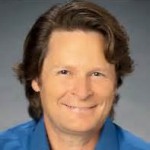
There is only one Presence and one Power active as the universe and as my life, God the Good.The Rev. Bill Englehart from Unity in Marin told us that Unity, founded in Kansas City, Missouri, in 1899, was part of the New Thought movement, that also includes Christian Science, Seicho-no-Ie (in Japan), Divine Science, and other iterations. Bill stated, “As we think, so we experience life.” He articulated the Five Principles of Unity:
- Our essence is of God; therefore, we are inherently good. This God essence was fully expressed in Jesus, the Christ.
- We are co-creators with God, creating reality through thoughts held in mind.
- Through prayer and meditation, we align our heart-mind with God. Denials and affirmations are tools we use.
- Through thoughts, words and actions, we live the Truth we know.
Bill stated, “Prayer is primary. Prayer changes us. We become like the god we worship.”
* * * * *
Some interesting facts I note is that of the composition of speakers about three different religions represented at the breakfast this year: (a) only one was Abrahamic; (b) two were monogamous; (3) two, being fewer than 250 years old, were New Religious Movements; and (4) one was non-deist. I’m proud to be a member of an organization that welcomes and respects people of all religious persuasions and spiritual expressions.

